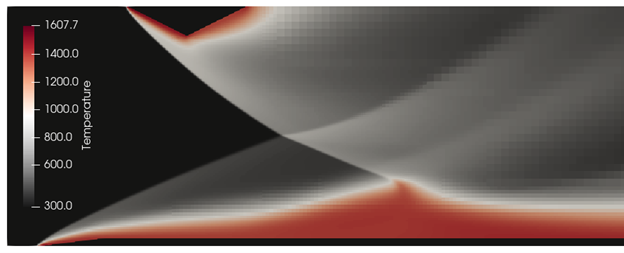Project Background
Hypersonic flows represent some of the most complex and difficult physics to describe in fluid mechanics. In the presence of solid bodies, they include highly non-linear and multi-scale turbulence, nearly discontinuous shockwaves, and enormous temperature increases that lead to the chemical dissociation of air. However, understanding and ultimately taming hypersonic flows is important for the next generation of transportation technologies by allowing for faster travel, higher efficiencies, and lower emissions.
Chemically reacting hypersonic flows are important in many aspects of future aircraft. For example, the chemically dissociated air is made up of many smaller, highly reactive chemical species that react with material surfaces in the flow. These reactions can accelerate the rate of damage and failure in these materials. Understanding the role of these chemical species and reactions on the surface is necessary to design better materials capable of enduring harsh hypersonic environments. As a second example, understanding how to efficiently extract chemical energy by burning fuels at hypersonic flight conditions is necessary to enable faster flight. Advanced concepts like the Rotating Detonation Engine provide a potential path forward, but their flame and flow dynamics need to be better understood.
In this project, students will perform Computation Fluid Dynamics (CFD) simulations of interesting chemically reacting hypersonic flow systems like those described above with the goals of better understanding the important physics present in these systems and developing models capable of describing their behavior. Their work will ultimately be used to improve technologies operating in hypersonic flows.
Student Role
The student's role in this project consists of three main tasks:
1. Perform high-resolution simulations of chemically reacting hypersonic flows
2. Analyze this data to better understand and characterize the complex physics
3. Leverage this knowledge to develop and improve physical models
In the first task, the student will learn how to use the CFD code used in our research group to simulate chemically reacting hypersonic flows. By performing simulations at very high resolution, the student can resolve all fundamental physics and scales thereby providing the necessary data to better understand the underlying physics.
In the second task, the student will learn to work with this high-resolution data to learn more about the complex physical processes. The student will be tasked with extracting the data from the simulation, writing analysis tools to view and interpret relevant quantities, and presenting their novel findings.
In the third task, the student will use what they've learned to develop and improve existing models capable of predicting the hypersonic flow processes occurring in their system. These models will be compared to existing models to demonstrate improvements.
Student Learning Outcomes and Benefits
This research experience will provide students with the background and skills required for a range of Mechanical and Aerospace engineering positions in industry, academia, or government laboratories. Major technical outcomes include:
1. Learning to use an advanced CFD code for the simulation of chemically reacting hypersonic flows. Such codes are used to simulate, for example, advanced rocket and aircraft engines. The skills are easily transferable to subsonic and non-reacting systems relevant to, for example, aircraft design and wind turbines.
2. Familiarity with High Performance Computing (HPC) cluster usage. HPC clusters are collections of many communicating computers that allow for simulation of computationally intensive problems. Students will learn how to run their simulations on a cluster, a skill transferable to clusters used by industry/academia/government labs.
3. A better understanding of data analysis and visualization with Python/MATLAB. Students are welcome to develop skills in whichever scripting language they prefer.
4. Familiarity with presenting technical work. The student will be expected to meet with the mentor weekly and present their work at group meetings. The ability to present technical topics clearly and succinctly is an invaluable skill in engineering.

Alex Novoselov
I believe that undergraduate students who take part in the SPUR program should perform relevant, achievable, and interesting research. The mentor plays a big role in making this possible. Relevant research requires that the mentor provides worthwhile research to the students, rather than simple toy problems that have no actual bearing to the research community. Achievable research requires that the mentor understands the background abilities of the student, plans the project out accordingly, and provides adequate support to the student so they can learn the necessary skills and topics to succeed. Interesting research requires that the mentor presents the topic in a way that appeals to the student by considering their background and interests.
It is my philosophy that for students to excel at research, there needs to be a combination of time spent self-studying and learning from the mentor. For this reason, I will meet with the student weekly to assess their progress and provide important input and lessons. The student will be guided on which topics they should learn and be provided with the relevant sources for this knowledge but are always encouraged to communicate with the mentor if they are struggling. This can occur through additional meetings or email depending on the preferences of the student.
One of the most important qualities in a successful engineer is the ability to clearly present technical results. Students will be offered opportunities to hone their skills both in meetings with the mentor, as well as in monthly meetings with the entire research group. I believe providing constructive feedback to students regarding their presentations allows them to better develop their skills.
